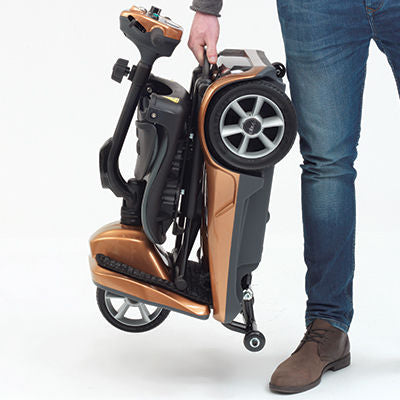When it comes to mobility scooters, choosing the right material is crucial for durability, performance, and overall user experience. Two popular options in the market are steel, aluminum, and the relatively new contender, magnesium. In this blog post, we will explore the characteristics of each material and determine which one is best suited for mobility scooters.
Strength and Weight
Steel has long been known for its exceptional strength, making it a common choice for heavy-duty applications. However, this strength comes at a cost - weight. Steel mobility scooters tend to be heavier, which can make them more challenging to maneuver and transport.
Aluminum, on the other hand, offers a good balance between strength and weight. It is lighter than steel while still providing adequate durability. Aluminum mobility scooters are easier to handle and transport, making them a popular choice among users.
Now, let's talk about magnesium. This material has gained attention in recent years due to its impressive strength-to-weight ratio. Magnesium mobility scooters are incredibly lightweight, making them ideal for individuals who require easy portability. Despite their lightness, magnesium scooters maintain excellent structural integrity.
Corrosion Resistance
One of the biggest concerns when it comes to mobility scooters is their exposure to the elements. Steel is prone to rust and corrosion, especially when exposed to moisture. Regular maintenance and protective coatings are necessary to prevent deterioration.
Aluminum, on the other hand, naturally forms a protective oxide layer when exposed to air, which helps prevent corrosion. This makes aluminum mobility scooters more resistant to rust and other forms of degradation.
Magnesium, similar to aluminum, also forms a protective oxide layer. However, it is more susceptible to corrosion than aluminum. Manufacturers have addressed this issue by applying special coatings and treatments to enhance the material's corrosion resistance.
Cost and Availability
Steel is a widely available and cost-effective material, making it a popular choice for budget-conscious individuals. However, it is important to consider the added weight and potential maintenance costs associated with steel mobility scooters.
Aluminum is also readily available and falls within a moderate price range. Its lightweight nature and corrosion resistance make it a practical choice for many users.
Magnesium, being a relatively new material in the mobility scooter industry, is less common and may come at a higher price point. However, its exceptional lightweight properties and durability make it a worthwhile investment for those seeking optimal portability.
Conclusion
When it comes to choosing the best material for mobility scooters, it ultimately depends on individual needs and preferences. Steel offers exceptional strength but comes with added weight and maintenance requirements. Aluminium strikes a good balance between strength, weight, and corrosion resistance. Magnesium, although less common and potentially more expensive, provides unmatched lightweight performance.
Consider your specific requirements, such as portability, durability, and budget, when making your decision. Consulting with a mobility scooter expert can also provide valuable insights and guidance in selecting the material that best suits your needs.

